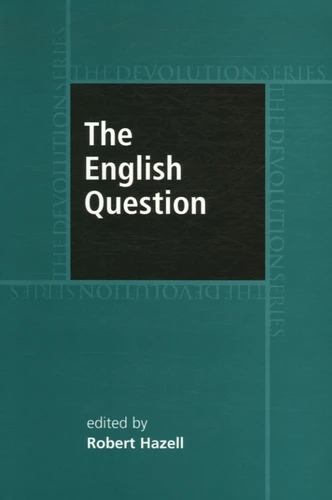The English Question
Par :Formats :
Définitivement indisponible
Cet article ne peut plus être commandé sur notre site (ouvrage épuisé ou plus commercialisé). Il se peut néanmoins que l'éditeur imprime une nouvelle édition de cet ouvrage à l'avenir. Nous vous invitons donc à revenir périodiquement sur notre site.
- Paiement en ligne :
- Livraison à domicile ou en point Mondial Relay indisponible
- Retrait Click and Collect en magasin gratuit
- Réservation en ligne avec paiement en magasin :
- Indisponible pour réserver et payer en magasin
- Nombre de pages270
- PrésentationBroché
- Poids0.43 kg
- Dimensions15,5 cm × 23,0 cm × 2,0 cm
- ISBN0-7190-7369-3
- EAN9780719073694
- Date de parution01/01/2006
- CollectionThe Devolution series
- ÉditeurManchester University Press
Résumé
England remains a gaping hole in the devolution settlement. Devolution will not be complete, and the settlement may not be stable, until the English Question has been solved. Does England need to find its own political voice, following devolution to Scotland and Wales? Do the English want an
English parliament; regional assemblies in England; or 'English votes on English laws'? Or are the English content to muddle through, with no separate representation or political voice? The book includes analysis of the 2004 North East referendum and the feasibility of English votes on English laws. Other chapters give the latest survey findings on English identity and English attitudes to devolution, and place the English regional debate in a European comparative context. This is an important and timely book, written by the leading experts in the field. It will be of interest to policy makers and practitioners dealing with the realities of governing England, and to academics and students of devolution and the English Question.
England remains a gaping hole in the devolution settlement. Devolution will not be complete, and the settlement may not be stable, until the English Question has been solved. Does England need to find its own political voice, following devolution to Scotland and Wales? Do the English want an
English parliament; regional assemblies in England; or 'English votes on English laws'? Or are the English content to muddle through, with no separate representation or political voice? The book includes analysis of the 2004 North East referendum and the feasibility of English votes on English laws. Other chapters give the latest survey findings on English identity and English attitudes to devolution, and place the English regional debate in a European comparative context. This is an important and timely book, written by the leading experts in the field. It will be of interest to policy makers and practitioners dealing with the realities of governing England, and to academics and students of devolution and the English Question.

